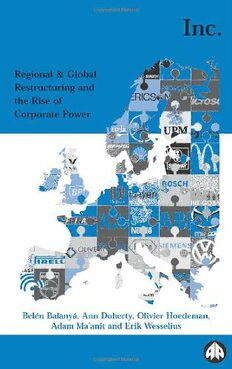
Europe Inc.: Regional and Global Restructuring and the Rise of Corporate Power PDF
270 Pages·2000·1.884 MB·English
Most books are stored in the elastic cloud where traffic is expensive. For this reason, we have a limit on daily download.
Preview Europe Inc.: Regional and Global Restructuring and the Rise of Corporate Power
Description:
Over the past two decades the major international corporations have become industrial lobbyists within the European Community, to such an extent that they pose a threat to democracy. In turn the EC has been very receptive to the political agenda of corporate interest groups, in particular to the notion of making Europe a free trade zone. This book provides an insight into the systematic ways in which transnational corporations work through lobby groups to shape EU policy. The authors cover the major players in this anti-democratic practice and analyze the structural and political factors which have enabled corporate political influence in Europe to dominate. They examine: how governments have been persuaded to increase competitiveness by dismantling and privatising public services, deregulating industry and dismantling social and environment protections; the increasing influence of corporate lobby groups on decision makers and the corresponding lack of voice given to small business, organised labour and individual citizens; the impact of the single market and currency; structural adjustment in eastern Europe; and the role of the European industrial lobby groups within the WTO and the important multilateral agreement on investment. The range of case studies include European lobbying within the biotech industry, the PR industry and the UN climate summit.
See more
The list of books you might like
Most books are stored in the elastic cloud where traffic is expensive. For this reason, we have a limit on daily download.
